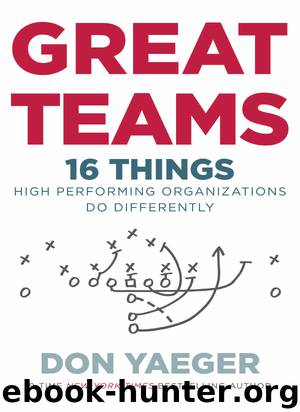Great Teams by Don Yaeger

Author:Don Yaeger
Language: eng
Format: epub
Publisher: Thomas Nelson
Published: 2016-05-31T16:00:00+00:00
In sports or in business, leadership changes don’t have to spell disaster. Any organization can emerge from a transition stronger and better equipped for the future if it approaches the process strategically, maintains a strong team culture, and focuses on the greater purpose to minimize disruptions and propel the organization forward toward a bright new future.
CHAPTER 10
GREAT TEAMS ADAPT AND EMBRACE CHANGE
They understand that past results might not guarantee future success.
Charles Darwin has been quoted as saying, “It is not the strongest or the most intelligent who will survive, but those who can best manage change.”1 And as we’ve seen in the previous chapter, the sports and business landscapes are constantly transitioning both internally and externally. What sowed success one year might not necessarily work the next.
Being resistant—or even oblivious—to change is a common mistake. Great Teams keep their eyes open to what is going on and tweak their methods to ensure an ability to thrive in changing circumstances. At the same time, their leaders remain mentally tough and understand the importance of focusing on the task at hand in the midst of changing circumstances.
In this chapter, we will look at how great winners welcome new ideas and strategies to consistently return to championship heights.
GREAT TEAMS IN SPORTS
NCAA men’s basketball offers special case studies in adaptation, since the new normal consists of coaching one-and-done athletes who go pro after just one year of collegiate play. For Mike Krzyzewski of Duke and John Calipari of the University of Kentucky—head coaches to two of the most consistently successful basketball programs in the country—mastering change requires teaching new generations differently while maintaining core values.
“Our culture is still value based,” Krzyzewski said, who had three freshmen declare for the NBA Draft after winning the 2015 NCAA championship. “Trust, honesty, teamwork, loyalty, care, and collective responsibility—all of these things are the same over my three decades at Duke, but they are taught differently than twenty years ago, because communication changes as well.”
Adjustment, especially in communication methods, is constant for Krzyzewski in order to remain relevant and at the top of his profession. He says Duke’s values are “taught differently and by different people” today than they were when he won his first title in 1988—before any of his current players were even born!
“The younger players see the world differently,” Krzyzewski said. “And it’s up to you as the communicator to know who you are addressing. It is not some sort of science, but more about knowing people and wanting to learn more about them and not making those athletes fit into a thing that you did a year ago. Adjustment is hard, but is a lot easier if you, as a leader, are a willing learner.”
Likewise, John Calipari has maintained a winning culture that regularly recruits the one-and-done players who are attracted to Kentucky for the sole reason of wanting to increase their odds of playing in the NBA. And he does it by relying on team culture and values for stability in the midst of change.
Download
This site does not store any files on its server. We only index and link to content provided by other sites. Please contact the content providers to delete copyright contents if any and email us, we'll remove relevant links or contents immediately.
| Ethics | Etiquette |
| Fashion & Image | Health & Stress |
| Motivation & Self-Improvement | Work Life Balance |
| Workplace Culture |
Tools of Titans by Timothy Ferriss(8402)
Change Your Questions, Change Your Life by Marilee Adams(7786)
Deep Work by Cal Newport(7089)
Playing to Win_ How Strategy Really Works by A.G. Lafley & Roger L. Martin(6316)
Man-made Catastrophes and Risk Information Concealment by Dmitry Chernov & Didier Sornette(6022)
Big Magic: Creative Living Beyond Fear by Elizabeth Gilbert(5778)
Digital Minimalism by Cal Newport;(5767)
Ego Is the Enemy by Ryan Holiday(5453)
The Slight Edge by Jeff Olson(5420)
The Motivation Myth by Jeff Haden(5214)
The Laws of Human Nature by Robert Greene(5213)
Stone's Rules by Roger Stone(5089)
Tuesdays with Morrie by Mitch Albom(4788)
Eat That Frog! by Brian Tracy(4543)
Rising Strong by Brene Brown(4465)
Skin in the Game by Nassim Nicholas Taleb(4253)
The Money Culture by Michael Lewis(4211)
Bullshit Jobs by David Graeber(4195)
Skin in the Game: Hidden Asymmetries in Daily Life by Nassim Nicholas Taleb(4009)
